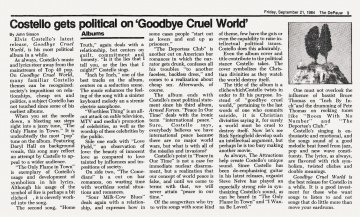|
Elvis Costello's latest release, Goodbye Cruel World, is his most political album in a while.
As always, Costello's music and lyrics steer away from the mainstream of Top 40 pop. On Goodbye Cruel World, many familiar Costello themes can be recognized: society's impositions on relationships, cheap sex and politics, a subject Costello has not touched since some of his earliest albums.
When you set the needle down, a bleeting sax steps right into a jazzy tune, "The Only Flame in Town." It is undoubtedly the most "pop" tune on the album. Featuring Daryl Hall on background vocals, this song may reflect an attempt by Costello to appeal to a wider audience.
"The Only Flame in Town" is exemplary of Costello's usage and development of symbolism in his lyrics. Although his usage of the symbol of fire is perhaps a bit cliched, it is cleverly worked into the song.
The second song, "Home Truth," again deals with a relationship, but centers on guilt, commitment and honesty. "Is it the lies that I tell you, or the lies that I might?" Costello sings.
"Inch by Inch," one of the best tracks on the album, centers on a seduction scene. The music enhances the feeling of the song with a sinister keyboard melody an a sirenic electric saxophone.
"Worthless Thing" is an all out attack on cable television, MTV and media's promotion of celebrities, as well as the worship of these celebrities by the public.
Side one ends with "Love Field," an observation of love: the beauty of innocent love as compared to love tainted by influences and impositions of society.
On side two, "The Comedians" is a cut on bar romances, on wasting time with worthless social situations and romances.
"Sour Milk-Cow Blues" deals again with a relationship, and expresses how in some cases people "start out as lovers and end up as prisoners."
"The Deportess Club" is another cut on American bar romances in which the narrator gets drunk, confesses all his troubles "to another faceless, backless dress," and comes to a realization about cheap sex. Afterwards, of course.
The album ends with Costello's most political statement since his third album, Armed Forces. "Peace In Our Time" deals with the ironic term "international peace." Sure, Costello says, everybody believes we have international peace because there are no major world wars, but what is with all of the missiles and invasions?
Costello's point in "Peace in Our Time" is not a case for immediate nuclear disarmament, but a realization that our concept of world peace is false, and until we come to terms with that, we will never attain "peace in our time."
Of the songwriters who try to write songs with some kind of theme, few have the guts or even the capability to raise intellectual political issues. Costello does this admirably.
Even the album cover and title contribute to the political stance Costello takes. The cover symbolizes the Christian divinities as they watch the world destroy itself.
The title of the album is a cliche which Costello twists in order to fit his purpose. Instead of "goodbye cruel world," pertaining to the last words of one who commits suicide, it is Christian divinities saying it, for surely a world must be cruel to destroy itself. Now let's see Rick Springfield develop such an intellectual argument, but perhaps he is too busy making another movie.
As always, The Attractions help create Costello's unique sound. Since Costello has been de-emphasizing guitar in his latest releases, organist Steve Neive has played an especially strong role in synthesizing Costello's sound, as can be heard in "The Only Flame In Town" and "I Wanna Be Loved."
One must not overlook the influence of bassist Bruce Thomas on "Inch By Inch" and the drumming of Pete Thomas on rocking tunes like "Room With No Number" and "The Deportee's Club."
Costello's singing is enthusiastic and emotional, and the songs sound of a good melodic beat fused from jazz, pop and new wave constituents. The lyrics, as always, are flavored with rich symbolism, twisted cliches and double meanings.
Goodbye Cruel World is the best release for Costello in a while. It is a good investment for those who want songs to listen to and not songs that do little more than move your eardrums.
| 
